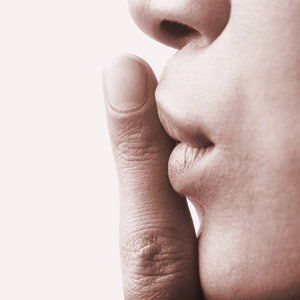
Some years ago, a women’s NGO in South Africa published a poster with the slogan “Abusive speech is a deadly weapon,” designed to create awareness about the impact of verbal abuse in intimate partner relationships. Little did they know that verbal abuse would become a source of national debate in the country, spurred on by careless comments uttered by ANC Youth League president Julius Malema.
Just when we were becoming a bit accustomed to Malema’s antics and utterances, and convinced – as he might be – of his “untouchableness,” the Equality Court ruling in favour of NGO Sonke Gender Justice renewed our confidence in the justice system. Sonke brought a case of hate speech and harassment against Malema after his words in front of hundreds of students at the Cape Peninsula University of Technology in January 2009. The court papers confirm that Malema told his audience "when a woman didn't enjoy it, she leaves early in the morning. Those who had a nice time will wait until the sun comes out, request breakfast and ask for taxi money."
The statements referred to the case of “Kwezi” – the woman who in 2006 accused President Jacob Zuma of rape. Malema’s words seemed to convey to young students how survivors of rape should or should not behave after such a crime. In Malema’s view, Kwezi was not a victim of rape, the proof being that she stayed in the house of the accused and asked for breakfast and taxi money the morning after.
The judgment fully supported Sonke’s submission that argued Malema’s words amounted to hate speech. That is, his words can be construed to demonstrate a clear intention to be hurtful, be harmful or incite harm and promote or propagate hatred, in this case towards women and rape victims.
Furthermore, the court found Malema guilty of harassment, defined by the law as an unwanted conduct that humiliates or creates a hostile or intimidating environment, or is calculated to induce submission based on, among others, sex and gender. The court found that Malema had made insensitive comments and generalisations about women and rape victims, which can lead to further violence.
In its findings, the court stressed that as a public figure, the potential influence of Malema’s words are even greater, particularly among youth, hence the need to be more aware of the content of his public utterances. The court ruled that Malema must contribute R50,000 to an organisation that provides shelter for abused women, and to issue a public apology within two weeks.
This case has raised debate in the media and private circles about men’s entitlement to sex, and myths around rape and how a victim of rape is “supposed” to behave. While the court’s decision is welcome, the surrounding controversy has also shown us the enormous amount of work ahead to change the mindsets of millions of South Africans. Civil society and gender equality advocates have so much work to do, given the prevailing attitudes that still carry a blame culture against victims.
On a much more positive note, this experience also shows us that there are more than just a few good men willing to challenge the culture of violence against women, whether physical or verbal. We must applaud Sonke Gender Justice for taking up this case, even though they have picked up some enemies along the way.
When a public servant from a government department enquired about names of NGOs who could conduct workshops for his fellow co-workers during the 16th Days of Activism late last year, I immediately suggested Sonke. However, the response was not that enthusiastic, as the employee retorted, “Are not these the guys who started the case against Julius Malema?” Needless to say, he was not interested in their contact details anymore.
This shows a worrying trend among government officials who profess openness and willingness to engage with civil society - particularly on gender-based violence issues - but are quick to dismiss criticism and “blacklist” whoever dares to speak truth to power and challenge patriarchal views which are at the core of the epidemic of rape and violence against women in South Africa.
Maybe Malema should lead the way in terms of seriously engaging with civil society organisations who are trying to turn the tide of violence. What about joining one of the capacity-building workshops run by Sonke for men who want to contribute to ending violence against women? Or may be become a patron of the latest Sonke campaign, Brothers for Life?
Aside from a public apology, the judgment could have also considered a sort of community work for Malema, may be some training on counselling women victims of rape? He would have learned that there are thousands of women raped every day, not only by strangers, but by their partners, by so called friends and family members, and by work mates.
The fact that they live or work under the same roof and cannot easily speak out about the crime does not take away the fact that they have been raped. Maybe after listening to some of their stories Julius Malema will realise that spreading myths contributes to the high levels of rape in our society and that abusive speech is indeed a deadly weapon.
Angelica Pino is the Gender Justice Programme Manager at Gender Links. This article is part of the GL Opinion and Commentary Service.
Do you agree? Is language a deadly weapon? Tell us what you in think in the box below...




 Publications
Publications
 Partners
Partners









